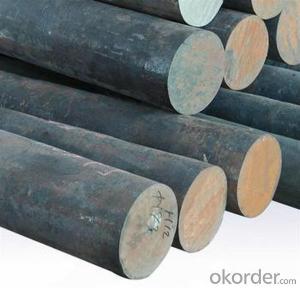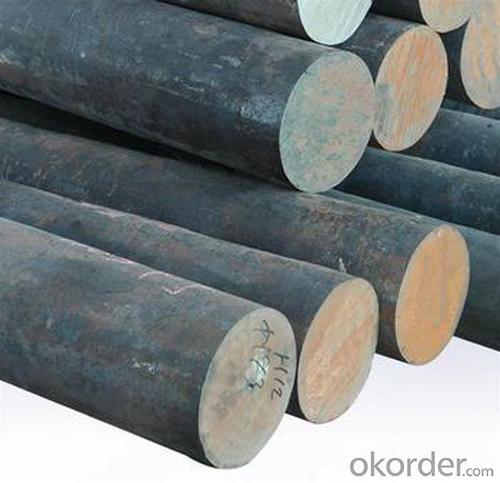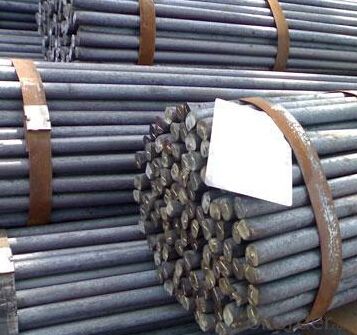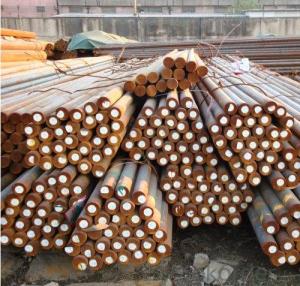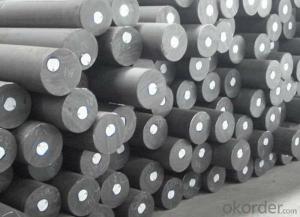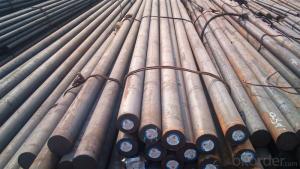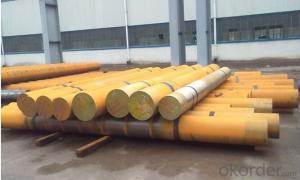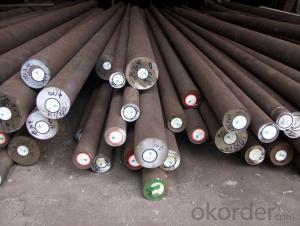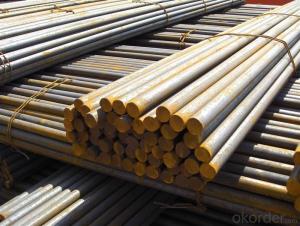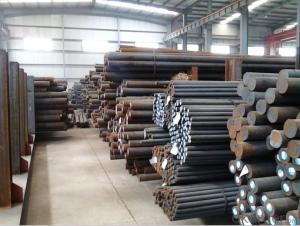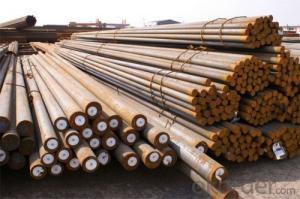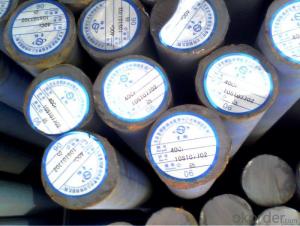Steel 4Cr13 Alloy Steel Round Bar Special Steel
- Loading Port:
- China main port
- Payment Terms:
- TT OR LC
- Min Order Qty:
- 25 m.t.
- Supply Capability:
- 10000 m.t./month
OKorder Service Pledge
OKorder Financial Service
You Might Also Like
Specification
Chemical Composition(GB)%
| C | Si | Mn | Cr | P | S |
| 0.4 | 0.5 | 0.7 | 13 | ≤0.030 | ≤0.030 |
Standard
| GB | ASTM | DIN | JIS |
| 4Cr13 | 4.2 | 1.2083 | 420J2 |
Available Size
| Rolled plate | 12-120mm*720mm*6000mm | ||
| Module | 130-400mm*1000mm*6000mm | ||
Heat Treatment
| Processing | Temperature ℃ | Hardness |
| Anneal | 750-800 | ≤235HB |
| Quenching | 1050-1100 | ≥50HRC |
| Tempering | 200-300 | ≥50HRC |
Characterstics
| 1.High corrosion resistance and mirror performance | |||||
| 2.Higher strength and abrasion resistance |
Applications:
Suitable for precise dies with super mirror performance and abrasion resistance,camera components,optical lens
Product Show:


1, Your advantages?
professional products inquiry, products knowledge train (for agents), smooth goods delivery, excellent customer solution proposale
2, Test & Certificate?
SGS test is available, customer inspection before shipping is welcome, third party inspection is no problem
3, Payment Terms?
30% TT as deposit and 70% before delivery.
Irrevocable L/C at sight.
4, Trading Terms?
EXW, FOB, CIF, FFR, CNF
6, After-sale Service?
WE provides the services and support you need for every step of our cooperation. We're the business partner you can trust.
For any problem, please kindly contact us at any your convenient time.
We'll reply you in our first priority within 24 hours.
- Q: What are the different pharmaceutical grades of special steel?
- There are various pharmaceutical grades of special steel that are specifically designed and produced to meet the stringent requirements of the pharmaceutical industry. These grades are used in the manufacturing of equipment, instruments, and components that come into direct contact with pharmaceutical products. The different pharmaceutical grades of special steel include: 1. 316L Stainless Steel: This grade is widely used in pharmaceutical applications due to its excellent corrosion resistance and high purity. It is often referred to as surgical stainless steel and is suitable for parts that require frequent cleaning and sterilization. 2. 304 Stainless Steel: This grade is also commonly used in the pharmaceutical industry for its corrosion resistance and ease of fabrication. It is suitable for equipment and components that do not require as frequent cleaning or sterilization. 3. Duplex Stainless Steel: This grade offers a combination of high strength and corrosion resistance, making it suitable for applications where durability and reliability are key. It is often used in pharmaceutical processing equipment that handles aggressive chemicals or high-pressure environments. 4. Hastelloy: This is a nickel-based alloy that exhibits superior resistance to corrosion, heat, and chemicals. It is commonly used in pharmaceutical applications where extreme conditions are present, such as in reactors or vessels that handle highly corrosive substances. 5. Titanium: Although not technically steel, titanium is often considered a pharmaceutical-grade material due to its excellent biocompatibility and corrosion resistance. It is used in medical implants and devices, as well as in pharmaceutical equipment that comes into contact with sensitive drugs. These pharmaceutical grades of special steel are carefully selected based on their specific properties and suitability for pharmaceutical applications. They are manufactured and tested to ensure compliance with industry standards and regulations, such as Good Manufacturing Practices (GMP) and the United States Pharmacopeia (USP). Using the appropriate grade of steel in pharmaceutical manufacturing helps to ensure product safety, quality, and integrity.
- Q: What are the different forging grades of special steel?
- In the market, there exists a variety of forging grades for special steel, each possessing its own distinctive characteristics and applications. Among the most frequently utilized forging grades are: 1. Carbon Steel: Noted for its exceptional strength and durability, carbon steel is a favored option for forging. Its hardness and toughness are determined by the varying levels of carbon present. Carbon steel forgings find widespread usage in the automotive, construction equipment, and machinery industries. 2. Alloy Steel: By incorporating diverse alloying elements, such as manganese, chromium, nickel, or molybdenum, into carbon steel, alloy steel is created. This augmentation enhances its strength, corrosion resistance, and wear resistance. The aerospace, defense, oil and gas, and power generation sectors extensively employ alloy steel forgings. 3. Stainless Steel: Stainless steel, an alloy resistant to corrosion, contains a minimum of 10.5% chromium. It boasts remarkable resistance against rust and staining, rendering it suitable for applications in harsh environments or where hygiene is of utmost importance. Stainless steel forgings are commonly employed in the food processing, chemical, and medical industries. 4. Tool Steel: Tailor-made for utilization in cutting tools, molds, and dies, tool steel exhibits high hardness, wear resistance, and toughness, enabling it to withstand elevated temperatures and heavy loads. Tool steel forgings are utilized in the production of drills, saw blades, punches, and an array of precision tools. 5. High-Speed Steel: High-speed steel, a specific type of tool steel, retains its hardness even when employed at high speeds. It incorporates additional elements such as tungsten, molybdenum, or vanadium, which enhance its resistance to heat and wear. High-speed steel forgings are employed in the production of cutting tools, drills, and milling cutters. 6. Maraging Steel: Maraging steel, a low-carbon, high-nickel steel alloy, is renowned for its extraordinary strength and toughness. Through heat treatment, it achieves high tensile strength while maintaining good ductility. Maraging steel forgings find extensive application in the aerospace, defense, and missile systems industries. These aforementioned examples merely represent a selection of the diverse forging grades of special steel available in the market. Each grade proffers distinct properties tailored to specific applications, ensuring the appropriate material can be chosen to meet desired performance and durability requirements.
- Q: How does special steel perform in high-velocity impact conditions?
- Special steel is specifically designed to provide exceptional performance in high-velocity impact conditions. Its unique composition and metallurgical properties make it highly resistant to deformation and failure when subjected to extreme forces. One of the key characteristics of special steel is its high strength, which allows it to withstand the tremendous forces experienced in high-velocity impact situations. This strength is a result of careful alloying and heat treatment processes that enhance the material's ability to absorb and distribute energy. As a result, special steel can effectively resist deformation and maintain its structural integrity even under severe impact loads. Additionally, special steel possesses excellent toughness, enabling it to absorb large amounts of energy before fracturing. This property is crucial in high-velocity impact conditions, where the material needs to withstand sudden and intense forces. The high toughness of special steel allows it to absorb and dissipate the impact energy, preventing catastrophic failure and ensuring the continued performance of the component or structure. Moreover, special steel often exhibits excellent wear and abrasion resistance, which is beneficial in high-velocity impact scenarios that involve sliding or rubbing contact. This resistance to wear ensures that the material retains its integrity and functionality even under prolonged and repetitive impact conditions, reducing the risk of premature failure. In summary, special steel performs exceptionally well in high-velocity impact conditions due to its high strength, excellent toughness, and superior wear resistance. Its ability to withstand extreme forces and absorb impact energy effectively makes it a preferred choice for applications where durability and reliability are paramount.
- Q: What are the different certifications available for special steel?
- There are several certifications available for special steel, depending on the specific industry and application. Some of the commonly recognized certifications include: 1. ISO 9001: This certification ensures that the special steel manufacturer has implemented and maintained a quality management system that complies with international standards. It demonstrates the company's commitment to consistently providing products that meet customer requirements. 2. ISO 14001: This certification focuses on environmental management and ensures that the special steel manufacturer has implemented environmentally friendly practices in their operations. It demonstrates the company's commitment to reducing their environmental impact. 3. ASME (American Society of Mechanical Engineers) certifications: ASME offers various certifications for special steel used in pressure vessels, boilers, and other applications. These certifications ensure that the special steel meets specific quality and safety standards required by the industry. 4. PED (Pressure Equipment Directive): This certification is required for special steel used in pressure equipment in the European Union. It ensures that the steel meets specific safety and quality requirements. 5. NACE (National Association of Corrosion Engineers) certifications: NACE offers certifications for special steel used in corrosive environments. These certifications ensure that the steel has the necessary resistance against corrosion and can withstand harsh conditions. 6. API (American Petroleum Institute) certifications: API offers certifications for special steel used in the oil and gas industry. These certifications ensure that the steel meets specific quality and performance standards required for various applications in the industry. 7. ASTM (American Society for Testing and Materials) certifications: ASTM offers various certifications for special steel based on specific standards and specifications. These certifications ensure that the steel meets the required mechanical properties, chemical composition, and other criteria. It is important for manufacturers, suppliers, and end-users to consider these certifications when selecting special steel for their specific applications. These certifications provide assurance and confidence in the quality, safety, and performance of the special steel products.
- Q: What are the factors that affect the mechanical properties of special steel?
- The mechanical properties of special steel are affected by several factors. Some of the key factors include the chemical composition of the steel, the heat treatment process, the presence of impurities or alloying elements, the microstructure of the steel, and the manufacturing process used. These factors can greatly influence the steel's strength, hardness, toughness, ductility, and corrosion resistance.
- Q: What are the different methods of surface polishing for special steel?
- There are several methods of surface polishing for special steel, each with its own advantages and applications. Some of the commonly used methods include mechanical polishing, electrochemical polishing, and chemical polishing. 1. Mechanical Polishing: This method involves the use of abrasive materials to remove surface imperfections and create a smooth and reflective surface. It can be done manually or using automated polishing machines. Mechanical polishing is effective for removing scratches, dents, and other surface defects. It is commonly used in industries such as automotive, aerospace, and precision engineering. 2. Electrochemical Polishing: Also known as electrolytic polishing, this method uses an electrolyte solution and an electric current to dissolve and remove surface material. Electrochemical polishing can provide a high level of surface smoothness and can be particularly useful for complex shapes and hard-to-reach areas. It is commonly used in industries such as medical devices, semiconductors, and jewelry manufacturing. 3. Chemical Polishing: This method involves the use of chemical solutions to selectively remove surface material and create a smooth finish. Chemical polishing is effective for removing oxide layers, stains, and contaminants. It is often used for stainless steel and other corrosion-resistant alloys. The process involves immersing the steel in a chemical bath and controlling factors such as temperature, concentration, and time to achieve the desired surface finish. 4. Electropolishing: Electropolishing is an electrochemical process that combines the benefits of electrochemical and chemical polishing. It involves the application of an electric current to remove surface material while simultaneously dissolving it in an electrolyte solution. Electropolishing can provide a highly smooth, clean, and corrosion-resistant surface finish. It is commonly used for stainless steel and other alloys in industries such as pharmaceutical, food processing, and semiconductor manufacturing. 5. Vibratory Polishing: This method utilizes vibrating media, such as ceramic chips or abrasive pellets, along with a polishing compound to remove surface imperfections. The steel parts are placed in a vibratory tumbler or bowl where the continuous movement causes the media to rub against the parts, resulting in a polished surface. Vibratory polishing is commonly used for small or delicate parts and can be an efficient and cost-effective method. Overall, the choice of surface polishing method for special steel depends on factors such as the desired surface finish, part geometry, material properties, and industry requirements. It is important to consider these factors and consult with experts or specialists to determine the most suitable method for a specific application.
- Q: Can special steel be used for making medical equipment?
- Yes, special steel can be used for making medical equipment. Special steel alloys, such as stainless steel, are commonly used in the manufacturing of medical equipment due to their high strength, durability, and corrosion resistance properties. These materials are essential for ensuring the safety and reliability of medical instruments and devices used in various healthcare settings.
- Q: What are the main applications of special steel in the medical field?
- Special steel is extensively used in the medical field for various applications. One of the main applications is in surgical instruments, where special steel's high strength, corrosion resistance, and ability to maintain sharpness make it ideal for creating durable and precise tools. Additionally, special steel is used in the manufacturing of medical implants such as joint replacements, where its biocompatibility and resistance to wear and tear ensure long-term success. Overall, special steel plays a crucial role in providing reliable and safe solutions for medical practitioners and patients in the healthcare industry.
- Q: Can special steel be used in the agricultural industry?
- Yes, special steel can be used in the agricultural industry. Special steels, such as high-strength and corrosion-resistant varieties, can be utilized for various applications in agriculture. These steels can be used to manufacture farm equipment, machinery, tools, and infrastructure such as storage containers, irrigation systems, and agricultural buildings. The properties of special steel, such as durability, resistance to wear and tear, and ability to withstand harsh environmental conditions, make it suitable for enhancing productivity and longevity in agricultural operations.
- Q: How is special steel used in the production of springs?
- Special steel is used in the production of springs due to its high strength and durability. The unique properties of special steel allow springs to withstand heavy loads and retain their shape even under extreme conditions. This enables springs to function effectively in various applications such as automotive, aerospace, manufacturing, and more.
Send your message to us
Steel 4Cr13 Alloy Steel Round Bar Special Steel
- Loading Port:
- China main port
- Payment Terms:
- TT OR LC
- Min Order Qty:
- 25 m.t.
- Supply Capability:
- 10000 m.t./month
OKorder Service Pledge
OKorder Financial Service
Similar products
Hot products
Hot Searches
Related keywords
